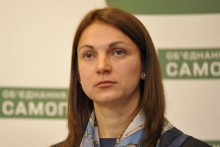Austria hosted the conference European Forum Wachau on June 13-14, entitled “Has Europe Reached Its Limits? Reflections on Europe’s Future Role on the Global Stage.” The event’s participants discussed the following topics: the EU as a provider of security, a new regime of the EU’s regional cooperation, and the EU and its neighbors. Chairperson of the Verkhovna Rada Committee on Foreign Affairs Hanna HOPKO, who participated in this conference, shared with The Day her impressions of this European Forum, and told us when the Austrian Parliament would ratify the Ukraine-EU Association Agreement.
“Austria is moving in the wake of the European Union, and this includes the sanctions, applying them without the enthusiasm, but still disciplined. In the same time, the economic losses to Austria through sanctions is a very important issue. So Vienna, perhaps, more than anyone in the EU, awaits for a peaceful solution to be agreed upon as soon as possible. The discussions about that are maintained at every level.
“In particular, Ukraine was the topic of the 20th European Forum Wachau, which is endorsed by Erwin Proell, prime minister of Lower Austria, and Sebastian Kurz, Federal Minister for Foreign and European Affairs. At the meeting, there was a recurring opinion that peace and success in Europe is impossible without the cooperation with Russia. Tinatin Khidasheli, Defense Minister of Georgia, responded well to that and received the overwhelming applause for the remark, that there is one more necessary condition – Russia should be democratic.
“Therefore, we must improve the Ukraine’s visibility in the information space; we need to be an integral part of various political processes through the participation in activities, like that Forum Wachau; we need to engage more in cultural activities, talking about new and modernized Ukrainian nation; and we should inform on the progress of reforms in Ukraine. We must show our progress and smash the Russian narrative about Ukraine as a failed state.
“It is important now to be included in the development of the EU media strategy in order to counter Russian propaganda. Federica Mogherini is going to present a plan of action for that in June. Now the OSCE journalism conference has started in Vienna. At the same time, there are discussions about ending the war in the format of the Munich Security Conference. In short, Vienna is, in modern terms, the European hub. And Ukraine must be visible here.”
What do the people in Austria think about how to make Russia adhere the international law, retreat in Donbas and return Crimea to Ukraine?
“It is important that you do not need to persuade anyone in Austria that Russian troops are killing soldiers and civilians in Ukraine, and that Russia failed to fulfill the Minsk agreement. There is another alarming issue: the Russian propaganda actively promotes the theses that every party in the war is wrong, that Ukraine failed as a state, that Russia was ‘provoked’ and so on. A tactic of distraction is sometimes, unfortunately, successful.
“As for Crimea – there is no question on the illegality of the annexation. The question is the probability of returning the peninsula to the jurisdiction of Ukraine. And in that regard there is still a lot to do for us.
“The big question: how to resolve the situation peacefully, and is there a plan B?
“The proposals to follow the Austrian path of neutrality are no longer being considered. They have understood that it is not perceived well in Ukraine. Meanwhile, Austria has much expectation to play a mediating role. A probable emergence of Martin Sajdik, Austrian top diplomat, as a member of the Contact Group is the embodiment of that desire.”
Why does the Austrian Parliament delay the ratification of the Association Agreement and how is the situation regarding the return of stolen assets developing?
“My impression is that the delay is more of a procedural nature. Austrians are themselves embarrassed that they are the last party to seal such an important matter. However, everyone insists that the ratification will take place, there are no objections. On June 30 the relevant committee will meet, the lower house should vote on July 6-7.
“The following vote in the upper house and the president’s signature are rather formal issues.
“In general, this visit gave me the opportunity to make a clearer picture of what is happening on the Austrian direction, including in its parliament. Parliamentarians mostly sympathize with Ukraine, there is a group of friends led by Thomas Schellenbacher, whom I met personally and who impressed me as a sincere, active person.
“I talked with him and the others about many things – the ratification, the continuing sanctions, the implementation of the Minsk agreement, the recovery of Yanukovych team’s assets...
“As expected, the Austrian side is waiting for the evidence from the Prosecutor General’s Office concerning such persons as Kliuiev and Azarov.
“Oleksandr Shcherba, the Ambassador, is not idle, he is intensively working on many issues, including those of the stolen assets. He keeps contact with the Federal Ministry of the Interior, the Federal Criminal Office. All of them say one thing: we are expecting from the Ukrainian Prosecutor General the justification of these individuals’ illegal actions – in particular, regarding the misappropriation of public funds and their illegal transfer abroad. Without concrete evidence from the investigation in Ukraine, no diplomacy can settle the situation.”








